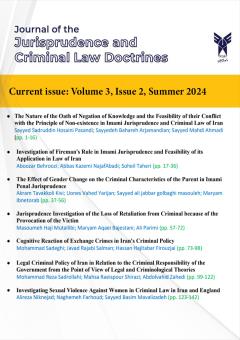Jurisprudence Investigation of the Loss of Retaliation from Criminal because of the Provocation of the Victim
Subject Areas : Jurisprudence and Criminal Law Doctrines
Masoomeh Hajimotallebi
1
,
maryam Aqaei Bejestani
2
*
![]() ,
Ali Parimi
3
,
Ali Parimi
3
1 - PhD student in criminal law and criminology, Semnan Branch, Islamic Azad University, Semnan, Iran
2 - Associate Professor, Department of Jurisprudence and Principles of Islamic Law, Semnan Branch, Islamic Azad University, Semnan, Iran
3 - Assistant Professor, Department of Theology and Islamic Studies, Payam Noor University, Tehran, Iran
Keywords: conditions of retaliation, loss of retaliation, causes of loss of retaliation, provocation in murder, provocation of criminal in killing,
Abstract :
Retaliation is one of the criminal rules of Islam, which has a deterrent role and according to the interpretation of Qur'an, is life-giving. As in Islam Criminal System, in certain circumstances, the criminal responsibility of a person is removed, retaliation is lossed in some cases. Sometimes, in the relationships between the offender and the victim, this fact is visited that a significant part of criminal’s stimulation takes place in the context of the victim's stimulation. This article with survey of Jurisprudence sources and attention in verdicts of Imami jurists, jurisprudence surveys the loss of retaliation of criminal in the period of provocation of victim. The analysis of some narrations, such as Sahiheh Solaiman Ebn Khaled and Sahiheh Halabi, indicates the role of effective provocation of the victim in the fall of retaliation. Therefore, by examining the general conditions of retaliation, it is concluded that the right of retaliation of victim is applied if the victim himself is the initiator of violation and the operator of provocation of the killer.
قرآن کریم
1. ابن فارس، احمد بن فارس، (1404ق)، معجم مقاییس اللغة، قم، انتشارات دفتر تبلیغات اسلامی (بوستان کتاب)، اول.
بابایی، محمد علی، (1390)، جرم شناسی بالینی، تهران، نشر میزان.
2. پاک نهاد، امیر، (1394)، عذر تحریک؛ مبانی و آثار مطالعه¬ای در حقوق ایران و انگلستان، مجله حقوقی دادگستری، شماره: 4.
3. پوربافرانی، حسن؛ شکوهنده، فرزانه، (1396)، قتل متعاقب تحریک مجنیٌّ علیه، در حقوق ایران و انگلستان، مجله حقوقی دانشگاه اصفهان، شماره: 5، ص20ـ29.
4. جمعى از پژوهشگران، (1417ق)، معجم فقه الجواهر، سيد محمود هاشمى شاهرودی، بیروت، مؤسسه الغدير.
5. جوان جعفری، عبدالرضا؛ شاهیده، فرهاد، (1395)، رفتار و گفتار تحریک آمیز بزه دیده در قوانین و مقرّرات کیفری و رویّة قضایی ایران، آموزههای حقوق کیفری، شمار: 5.
6. جوهرى، اسماعيل بن حماد، (1410ق)، الصحاح ـ تاج اللغة و صحاح العربية، بیروت، دار العلم للملايين.
7. حكيم، سيد محسن، (بی¬تا)، نهج الفقاهة، قم، انتشارات 22 بهمن.
8. حلّى، جعفر بن حسن، (1408ق)، شرائع الإسلام في مسائل الحلال و الحرام، قم، مؤسسه اسماعيليان.
9. خويى، سيد ابو القاسم، (1422ق)، مباني تكملة المنهاج، قم، مؤسسه إحياء آثار خوئي.
10. زاهدی، عبد الوحید، (1396)، ترجمه کامل حقوق جزا، تهران، انتشارات جاودانه جنگل.
11. سریانی، حبیب؛ مهدوی پور، اعظم؛ سید مرتضیحسینی، راحله، (1401)، بررسی فقهی و حقوقی سقوط قصاص در فرض تحریک مؤثّر مجنیٌّ علیه، فصلنامه پژوهش حقوق کیفری، شماره: 10(38)، ص37-73.
12. شهيد ثانى، زين الدين بن على، (1410ق)، الروضة البهية في شرح اللمعة الدمشقية، قم، كتابفروشى داورى.
13. طباطبائی يزدى، سید محمد كاظم، (1421ق)، حاشية المكاسب، قم، مؤسسه اسماعيليان.
14. غلاملو، جمشید و میرمجیدی، سپیده، 1400، دفاع از دست دادن کنترل؛ تحولات حقوقی قتل ناشی از تحریک شدید احساسات. آموزه های حقوق کیفری، 18(22 )، 219-254.
15. قائنی، محمد، 1396، القصاص، قم، مدرسه فقاهت.
16. کلانتری، کیومرث؛ هادیزاده، رضا، (1401)، بررسی اعتبار دلایل نظر مشهور فقهای امامیه در قتل اکراهی، فقه و اصول، شماره: 54 (1)، ص137-156.
17. كلينى، محمد بن يعقوب، (1407ق)، الكافي، تهران، انتشارات إسلاميه.
18. مجتهدی فر، حمیدرضا، (1401)، قصاص قبل اسلام تا ظهور اسلام، شیروان، یازدهمین کنفرانس ملی حقوق، علوم اجتماعی و انسانی، روانشناسی و مشاوره.
19. محقق داماد، سید مصطفی، 1364، دین، فلسفه و قانون، علی دهباشی، تهران، سخن و شهاب.
20. نائينى، محمد حسين، (1373ق)، منية الطالب في حاشية المكاسب، تهران، کتابفروشی محمديه.
21. نجفی، محمد حسن، (1363)، جواهر الکلام، بیروت، دار إحياء التراث العربي.

